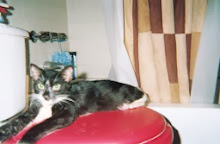 Wondrous Words Wednesday is a weekly meme hosted by Bermudaonion's Weblog where we share words that we’ve encountered in our reading. Feel free to join in the fun (please do!) Be sure to leave a link to your post over at Bermudaonion's Weblog.
Wondrous Words Wednesday is a weekly meme hosted by Bermudaonion's Weblog where we share words that we’ve encountered in our reading. Feel free to join in the fun (please do!) Be sure to leave a link to your post over at Bermudaonion's Weblog.These words are from Faith by Jennifer Haigh (ARC copy)
"Two mornings a week he'd met Father Cronin in the vestry at St. Dymphna's, helped him into his chasuble and alb." (p.25)
1. Chasuble (~ noun )
: The chasuble is the outermost liturgical vestment worn by clergy for the celebration of the Eucharist in Western-tradition Christian Churches that use full vestments, primarily in the Roman Catholic, Anglican and Lutheran churches, as well as in some parts of the United Methodist Church.
: a long sleeveless outer vestment worn by a priest when celebrating Mass
2. Alb (~ noun)
: a linen vestment with narrow sleeves, worn chiefly by priests, now invariably white in the Western Church but any color in the Eastern Church.
"He was young and fair-haired and wished himself elsewhere-among the ruins at Ostia Antica; kneeling before the sacrament at Santa Maria Maggiore; walking along the Tiber, breviary in hand." (p.28)
3. Breviary (~ noun)
: in the Roman Catholic Church, a book containing all the daily psalms, hymns, prayers, lessons, etc., necessary for reciting the office.
: a book of daily prayers and readings in some other churches.
"Every few weeks Joe Veltri cleaned their droppings from St. Francis's tonsured head." (p.67)
4. Tonsure (~ noun)
: the shaving of the head or of some part of it as a religious practice or rite, especially in preparation for entering the priesthood or a monastic order.
: the part of a cleric's head, usually the crown, left bare by shaving the hair.
“I can’t quite square it with the wild girl she once was, the céilí dancer, the hoyden of Dudley street.” (p.312)
5. Hoyden (~ noun)
: a boisterous, bold, and carefree girl; a tomboy

















































